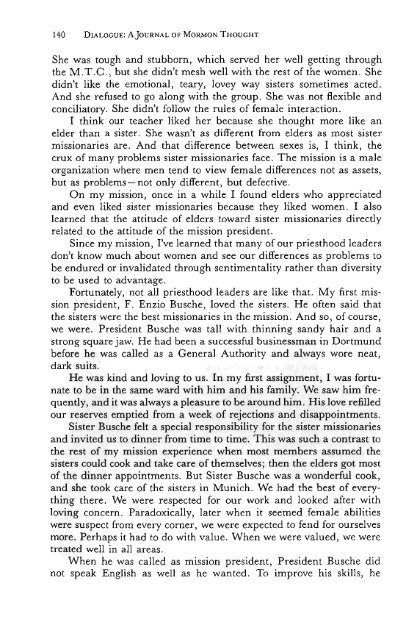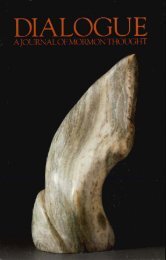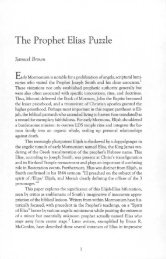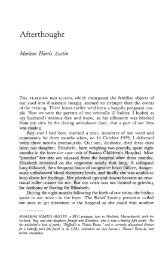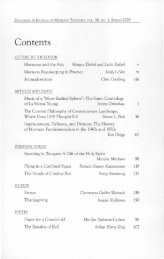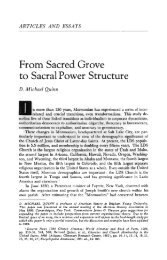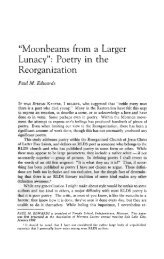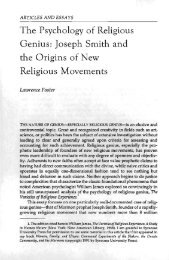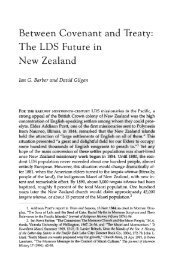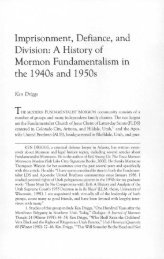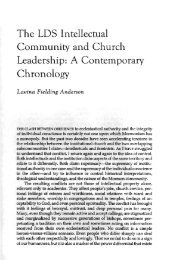Dialogue, Volume 25, Number 2 - Dialogue – A Journal of Mormon ...
Dialogue, Volume 25, Number 2 - Dialogue – A Journal of Mormon ...
Dialogue, Volume 25, Number 2 - Dialogue – A Journal of Mormon ...
Create successful ePaper yourself
Turn your PDF publications into a flip-book with our unique Google optimized e-Paper software.
140 DIALOGUE: A JOURNAL OF MORMON THOUGHT<br />
She was tough and stubborn, which served her well getting through<br />
the M.T.C., but she didn't mesh well with the rest <strong>of</strong> the women. She<br />
didn't like the emotional, teary, lovey way sisters sometimes acted.<br />
And she refused to go along with the group. She was not flexible and<br />
conciliatory. She didn't follow the rules <strong>of</strong> female interaction.<br />
I think our teacher liked her because she thought more like an<br />
elder than a sister. She wasn't as different from elders as most sister<br />
missionaries are. And that difference between sexes is, I think, the<br />
crux <strong>of</strong> many problems sister missionaries face. The mission is a male<br />
organization where men tend to view female differences not as assets,<br />
but as problems —not only different, but defective.<br />
On my mission, once in a while I found elders who appreciated<br />
and even liked sister missionaries because they liked women. I also<br />
learned that the attitude <strong>of</strong> elders toward sister missionaries directly<br />
related to the attitude <strong>of</strong> the mission president.<br />
Since my mission, I've learned that many <strong>of</strong> our priesthood leaders<br />
don't know much about women and see our differences as problems to<br />
be endured or invalidated through sentimentality rather than diversity<br />
to be used to advantage.<br />
Fortunately, not all priesthood leaders are like that. My first mission<br />
president, F. Enzio Busche, loved the sisters. He <strong>of</strong>ten said that<br />
the sisters were the best missionaries in the mission. And so, <strong>of</strong> course,<br />
we were. President Busche was tall with thinning sandy hair and a<br />
strong square jaw. He had been a successful businessman in Dortmund<br />
before he was called as a General Authority and always wore neat,<br />
dark suits.<br />
He was kind and loving to us. In my first assignment, I was fortunate<br />
to be in the same ward with him and his family. We saw him frequently,<br />
and it was always a pleasure to be around him. His love refilled<br />
our reserves emptied from a week <strong>of</strong> rejections and disappointments.<br />
Sister Busche felt a special responsibility for the sister missionaries<br />
and invited us to dinner from time to time. This was such a contrast to<br />
the rest <strong>of</strong> my mission experience when most members assumed the<br />
sisters could cook and take care <strong>of</strong> themselves; then the elders got most<br />
<strong>of</strong> the dinner appointments. But Sister Busche was a wonderful cook,<br />
and she took care <strong>of</strong> the sisters in Munich. We had the best <strong>of</strong> everything<br />
there. We were respected for our work and looked after with<br />
loving concern. Paradoxically, later when it seemed female abilities<br />
were suspect from every corner, we were expected to fend for ourselves<br />
more. Perhaps it had to do with value. When we were valued, we were<br />
treated well in all areas.<br />
When he was called as mission president, President Busche did<br />
not speak English as well as he wanted. To improve his skills, he


